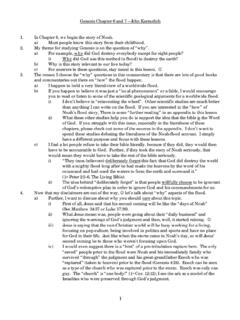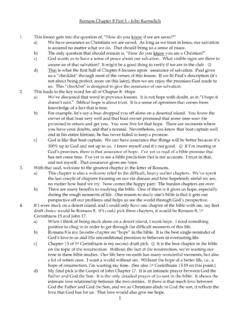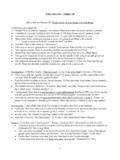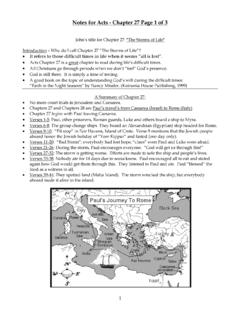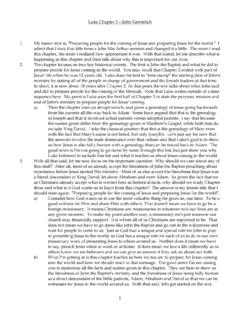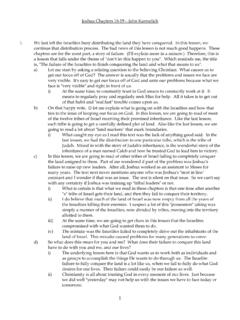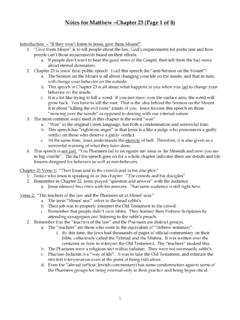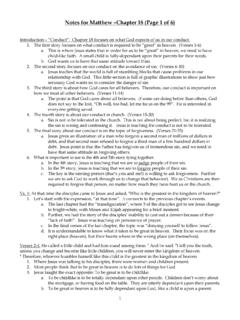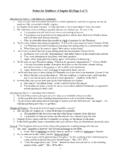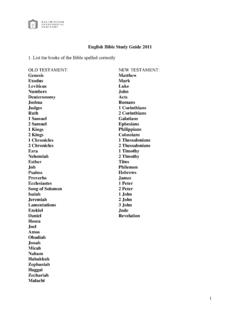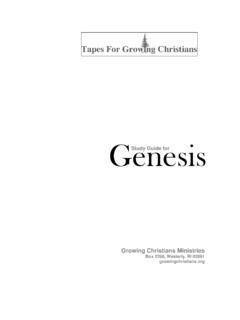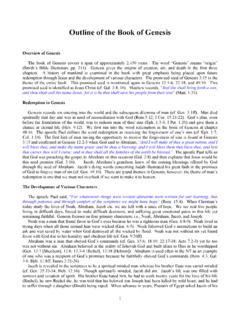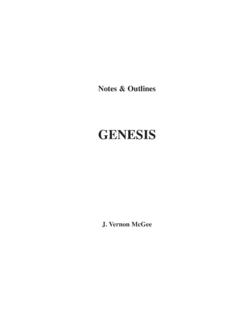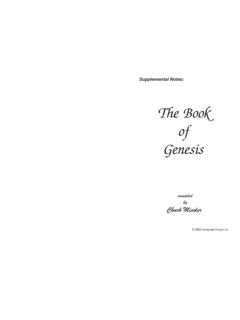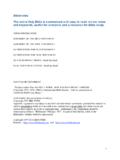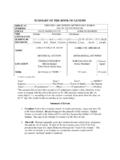Transcription of Genesis Chapter 10 and 11 – John Karmelich 1. If I …
1 1 Genesis Chapter 10 and 11 John Karmelich 1. If I had to describe the next two chapters in one word, it would be the word division . a) When I say division, I mean in the sense that the world becomes spiritually divided. b) Notice what Jesus says on division . Jesus said, Do you think I came to bring peace on earth? No, I tell you, but division. From now on there will be five in one family divided against each other, three against two and two against three. They will be divided, father against son and son against father, mother against daughter and daughter against mother, mother-in-law against daughter-in-law and daughter-in-law against mother-in-law.
2 (Luke 12:51-53, NIV) i) Jesus preached that not all people would get it. In fact, families would be divided as some members would be born again and others would not. ii) In that sense , we are going to see that here in Genesis 10 and 11. iii) Despite having Noah as a living witness, most people are going to turn away from God. We are going to have divisions among the descendants of Noah. 2. Chapters 10 and 11 are the bridge between Noah and Abraham. a) Abraham is considered the father of the Jewish nation. Abraham was specifically called by God to be the father of the Jewish people. i) Beginning in Chapter 12, we start a narrative detail of Abraham s life.
3 Ii) Genesis changes focus in Chapter 12 from a worldwide perspective to a one-family perspective on Abraham and his descendants. b) Chapters 10-11 are a 250-300 year period that describes the world-events in between the flood of Noah and the call of Abraham. 3. It s time for disclaimers about Chapter 10. J a) Chapter 10 is often called the Table of Nations . It lists 70 specific people that lead 70 specific tribes of nations. i) Many of these nations are then mentioned elsewhere in the bible. ii) Note that the Jews, ( , the Israelites) are not listed among these 70. iii) In a sense, Chapters 10 and 11 are non-Jewish . a) The word Gentiles and the word Nations are the same Hebrew word.
4 Iv) The focus is on all the Gentile (non-Jewish) Nations. b) Chapter 10, and parts of Chapter 11, read like a reference list. It is mostly genealogies. i) It is difficult to read this like a straight narrative. In that sense, it is boring to read. ii) This Chapter is best to see this section as a reference. iii) Most of the commentaries and study -bibles on this section are full of notes explaining who each of these 70 people (and tribes) are and who they become. iv) Many bible commentaries focus on the who question . If you haven t noticed by now, these lessons are on the why question . J v) As a Christian, I have now studied this section of the bible several times in my life.
5 Each time I learn what all of these names means. Soon afterwards, I forget. J vi) For those of you fascinated by the who question, there are lots of wonderful encyclopedia-like commentaries out there that focus on who each of these nations are, the archeological evidence for these nations, and where they are geographically. a) For example, you can read one of these names, and discover how this one ended up being an Arab-nation, or this one a Slavic nation, or this one a European nation. 24. If I had to pick the important thing to learn from these 70 names, it is validates bible as truth. a) Remember that God told Noah and his 3 sons to be fruitful and multiply and fill the whole earth with people.
6 We now have this recorded genealogy of the 3 sons of Noah and how their children became the origins of all the non-Jewish nations of the world. b) The tenth Chapter of Genesis .. stands absolutely alone in ancient literature, without a remote parallel, even among the Greeks, where we find the closest approach to a distribution of peoples in genealogical The Table of Nations remains an astonishing accurate document. (William F. Albright, cited in Boice, taken from David Guzik s commentary on Genesis ). 5. For many people, the best way to read Chapters 10-11 might be with a map at hand. Most study bibles come with a map of Chapter 10.
7 As an appendix to this lesson, I also cut and past two maps and a chart. You may want to separate the last page of this lesson and keep as a reference. a) Note that for some of the nations, there is some debate as the exact history and location. Archeologists study many secular records to validate the history of these names and people. Most have been validates by their locations. In a few cases, the exact location of where these tribes have ended up is uncertain. If you look at more than one bible map, you will see that some of the locations vary while some are more certain . 6. With that said, let s get started. Chapter 10, Verse 1: This is the account of Shem, Ham and Japheth, Noah's sons, who themselves had sons after the flood.
8 A) Let s look at the last verse of Chapter 10: These are the clans of Noah's sons, according to their lines of descent, within their nations. From these the nations spread out over the earth after the flood. i) The first and last verses of Chapter 10 are both similar summary statements. ii) In between the first and last verse of Chapter 10, are essentially, the details. b) OK, time for the first why question. Why did the bible bother to list these people? i) Let s face it, God could have summarized Chapters 10 and 11 much more briefly and said, The sons of Noah then had a bunch of kids, who spread out over all the earth. Why bother to list everyone?
9 Unless you are an archeologist, this is pretty dull reading. J How are these verses relevant to our life today? ii) First of all, they are a reminder of the validity of the bible. God listed all of them and archeologists have validated them as to support the literalness of the bible. iii) Second, God does care for all people. Many choose to willfully turn from God. a) This is good, and pleases God our Savior, who wants all men to be saved and to come to a knowledge of the truth. (1st Timothy 2:3, NIV) b) Jesus said, For many are called, but few are chosen. (Matt. 22:14, NKJV) iv) Remember that prior to the flood, most of the world chose to reject God.
10 Noah spent roughly a hundred years building an ark. I suspect he was mocked for his efforts and no one cared to join him. v) Now in the post flood world, with Noah being a living witness, most of the people we are going to read about choose to reject God. The sin gene was still present in Noah and his three sons. Despite the recent history of the flood, despite Noah remaining alive as a living witness, it shows how people still choose to reject God. vi) The why answer of Genesis 10 and 11 is to show how the continual pattern of the world s rejection of God. The bible is a repetitive pattern of the majority of people refusing to come to God despite God s best efforts to call people out of their own free will to come to him.
